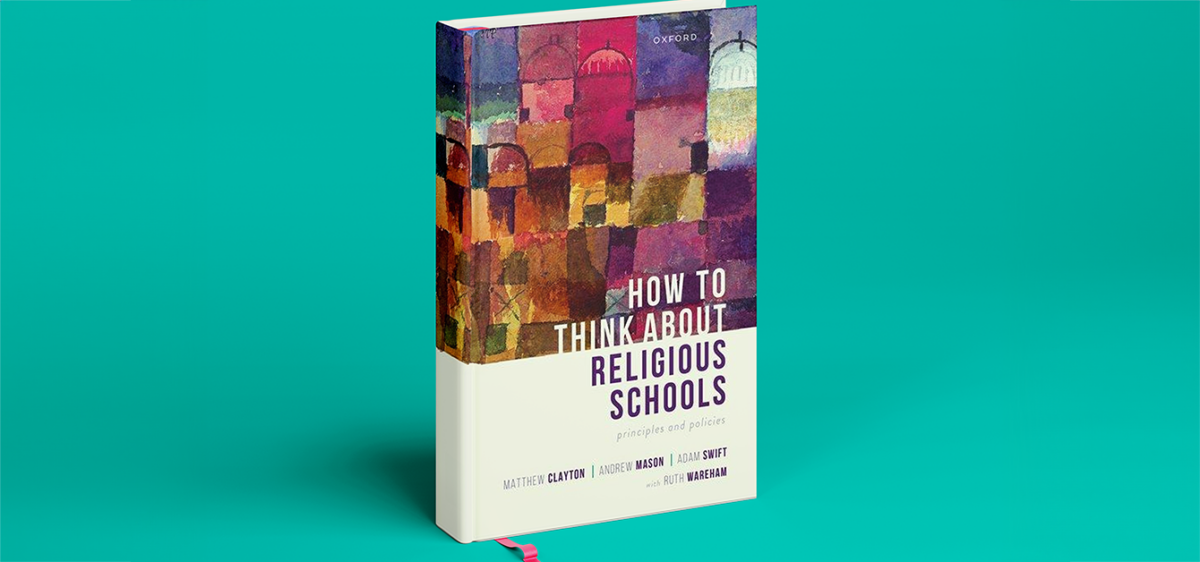
A new book by academics at UCL, the University of Warwick, and the University of Birmingham calls for major reforms to government policy on faith schools in England. Humanists UK, which has long campaigned for a fully inclusive state school system, free from religious indoctrination and discrimination, has welcomed the proposals. These include replacing collective worship with inclusive assemblies, replacing faith-based religious education (RE) with inclusive teaching, and capping religious selection in all state-funded faith schools.
In How to Think About Religious Schools, Professors Matthew Clayton, Andrew Mason, and Adam Swift, and Dr Ruth Wareham (who is also Humanists UK’s Education Policy Researcher) argue that practices such as compulsory collective worship and religious instruction place too much weight on the beliefs of parents and threaten the freedom of belief (and developing autonomy) of children and young people. Instead, pupils should be free to explore a range of religious and non-religious worldviews, like humanism, in school. To enable this, the authors suggest that all children (including those educated in private schools and at home) should have access to inclusive teaching on civic, religious, ethical and moral values (CREaM) that does not seek to impose a particular worldview.
The authors also suggest that, to enhance diversity and reduce community segregation, the 50% cap on religious selection in free schools with a religious character should be extended to cover all state-funded faith schools. Currently, many of these schools are permitted to select all their pupils by faith, not only leaving communities segregated along religious lines, but also by ethnicity and parental wealth. Indeed, a recent report by the Sutton Trust found that faith schools are ‘consistently more socially selective’ than schools without a religious character and admit far fewer pupils on free school meals than would be expected given their catchment areas. Despite this, earlier this year, the Conservative Government announced a proposal to abolish the cap. The new Labour Government is now due to decide how to respond to the consultation the previous Government launched on the matter.
Humanists UK Education Policy Researcher Dr Ruth Wareham, who co-authored the recommendations presented in the book, said:
‘In an increasingly diverse society, our education system must protect the rights and interests of children while also fostering inclusivity and mutual respect. We believe that our proposed reforms to faith school policy will help to safeguard pupils’ autonomy and equip them with the knowledge and skills needed to navigate life in a pluralistic society. By striking a better balance between educational goods, parental rights, and children’s rights, we can create a more equitable and inclusive education system that prepares students to thrive in a democratic society.’
Responding to the book’s release, Humanists UK Education Campaigns Manager Lewis Young commented:
‘We strongly welcome this call for policymakers to tackle the ongoing inequalities and discrimination caused by the law on religion in schools in England. The UK is the only sovereign state to mandate Christian worship in all schools as standard. It is also one of just a handful of countries that permits religious selection in institutions that are mostly funded by the public purse.
‘Requiring children to participate in activities like prayers and hymns, or limiting their religious education to faith-based instruction that promotes specific beliefs, ignores children’s rights to a broad education free from undue religious influence.
‘Our publicly funded schools should encourage children to make their own decisions about what they believe via inclusive assemblies and RE lessons that consider a variety of religious and non-religious perspectives in an objective manner. These schools should also be open to all regardless of background, giving children the opportunity to interact with people holding a variety of different beliefs on a daily basis.
‘Only through this type of inclusive education can we build a strong, cohesive society where everyone is valued and respected.’
Notes
For further comment or information, media should contact Humanists UK Director of Public Affairs and Policy Richy Thompson at press@humanists.uk or phone 0203 675 0959.
Find out more about How to Think About Religious Schools.
Read more about our work on state-funded faith schools, collective worship, and Religious Education.
Humanists UK is the national charity working on behalf of non-religious people. Powered by over 120,000 members and supporters, we advance free thinking and promote humanism to create a tolerant society where rational thinking and kindness prevail. We provide ceremonies, pastoral care, education, and support services benefitting over a million people every year and our campaigns advance humanist thinking on ethical issues, human rights, and equal treatment for all.
